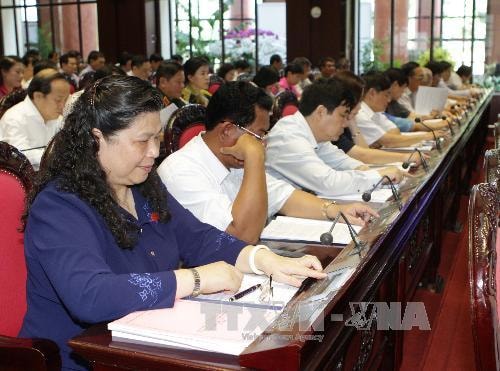Notaries are responsible for notarizing translations of documents.
On the morning of June 20, with a high approval rate (449 delegates approved, equivalent to 90.16% of the total number of National Assembly delegates), the National Assembly passed the Law on Notarization (amended). The Law consists of 10 chapters and 81 articles.
 |
| National Assembly deputies vote to pass the Law on Notarization (amended). Photo: VNA |
Before the law was passed, most of the opinions expressed agreed with the regulation on the scope of responsibility of notaries for notarizing translations of documents and papers. However, there were concerns about the feasibility of the regulation.
Explaining this issue, the National Assembly Standing Committee pointed out: The provisions in Clause 1, Article 2 and Article 61 of the draft Law on the scope of responsibility of notaries for notarizing document translations will create more convenience for people when they need to use notarized translations, avoiding the situation where when errors are discovered in the translation, people do not know who to seek compensation from. On the other hand, because they must take full responsibility to the person requesting notarization for the notarized translation, notaries and notary organizations must be very careful when choosing translation collaborators to ensure prestige and qualifications in order to be able to control the quality of the translation. Clause 1, Article 61 of the draft Law also clearly stipulates that translation collaborators must be responsible to the notary organization for the accuracy and appropriateness of the content of the translation they perform; this is also the basis for ensuring increased responsibility of translators in this process.
Due to differing opinions on this issue, the National Assembly Standing Committee directed the Secretariat of the session to send ballots to National Assembly deputies to seek their opinions on the scope of responsibility of notaries and notary organizations in notarizing translations. As a result, 327/393 opinions (accounting for 83.2% of the votes received and 65.7% of the total number of National Assembly deputies) agreed with the provisions in the draft Law; only 27/393 opinions (accounting for 6.9% of the votes received and 5.4% of the total number of National Assembly deputies) disagreed with this provision, 13 deputies had other opinions.
Therefore, the Standing Committee of the National Assembly requests the National Assembly to allow it to retain the provisions on the responsibilities of notaries and the procedures for notarizing translations as stated in the draft Law.
Regarding the standards for notaries, the law stipulates: Vietnamese citizens permanently residing in Vietnam, complying with the Constitution and laws, having good moral qualities and meeting the following standards shall be considered for appointment as notaries: Having a bachelor's degree in law; having worked in law for 5 years or more at agencies and organizations after having a bachelor's degree in law; graduating from the notary training course prescribed in Article 9 of this Law or completing the notary training course prescribed in Clause 2, Article 10 of this Law; meeting the requirements for the notary internship test; ensuring health to practice notary.
During the drafting and discussion process, there were opinions suggesting that it is necessary to have stricter regulations on the scope of people exempted from notary training and notary practice internship to ensure the quality of appointed notaries; ensure equivalent qualifications between those specified in Point a and those specified in Point c, Clause 1, Article 10; supplement civil servants directly performing state management activities on notary... The National Assembly Standing Committee believes that: The scope of subjects exempted from notary training is currently relatively wide and this regulation is suitable for the initial stage of socialization of the notary profession, when the number of notaries is still small and vocational training is also limited. However, recent reality shows that there are still many violations in notary activities performed by notaries in the group exempted from notary training.
Currently, the number of notaries nationwide has increased significantly, along with the training of notaries being increasingly focused, specialized and systematic, it is necessary to limit the scope of those exempted from notary training to ensure further improvement of the quality of appointed notaries. Therefore, to ensure equivalence in qualifications as well as actual working time between groups of subjects exempted from notary training, and to limit the number of people exempted from training, the National Assembly Standing Committee proposed to revise the regulation at Point a, Clause 1, Article 10 in the direction of only exempting notary training for those who have worked as judges, prosecutors, investigators for 5 years or more (equivalent to a minimum of 10 years of working in judicial agencies).
The Law also stipulates: Notary offices are organized and operate according to the provisions of this Law and relevant legal documents for the type of partnership. Notary offices must have two or more notaries. Notary offices do not have capital contributing members.
The Law on Notarization (amended) takes effect from January 1, 2015.
According to QĐND






